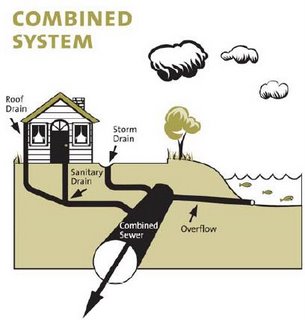 This is certainly a black eye for Windsor - City record 'abysmal' in sewage treatment
This is certainly a black eye for Windsor - City record 'abysmal' in sewage treatmentWindsor is addressing one of the issues identified in the report with the expansion of the Lou Romano treatment plant.
The report itself highlights what a complex issue this is for municipalities to deal with:
“Although it would be easy to point the finger at municipalities, the Great Lakes basin is a political quagmire that includes two countries, eight states, a province, dozens of tribes and First Nations and hundreds of local municipal and regional governments,” continued MacDonald. “The only way out of this mess is to have all levels of government make a renewed commitment to upgrade our aging sewage systems and conserve our precious freshwater resources.”That being said, I'm sure there is more that can be done by all Windsorites. I know at one time there was a program in Windsor to focus on removing downspouts from homes that were connected to the sewer. Whatever happened to this? I couldn't find anything on the City website other than the Sewer Use By-Law. Some of the areas most affected by old sewers are also the areas most likely to have these downspout connections (Wards 2, 3 and 4 I believe).
This is certainly one area that can be addressed at little or no cost to the City.
Some other things can easily be done by residents. The bonus is that not only are you helping reduce waste water but you will save money on both your water and energy bills:
- low-flow shower heads and faucet aerators can reduce your home water consumption as much as 50%, and reduce your energy cost of heating the water also by as much as 50%.Those are just a few ideas off the top of my head (and a little Google help!). Feel free to post any other no-cost/low cost ideas in the comments section.
- low-flow toilets can reduce 22,000 gallons of water per year for a family of four
- repair your leaking toilet. A leaking toilet can waste as much as 400 litres per day. How to tell if your toilet is leaking? Put a few drops of food colouring into your tank and wait 10 to 15 minutes. If the colouring shows up in your bowl, most likely your flapper needs replacing.
- repair leaking taps. Most often a leaky tap may only require new washers and O-rings. DIY instructions for faucet repair. Every leaky faucet could be costing you several dollars per month, more if it is a hot water faucet.
- rain barrels are back in fashion. While you can purchase commercial rain barrels one suggested source of free barrels are local do-it-yourself wine shops. If anyone knows of places in Windsor where free barrels can be had, drop a note in the comments.
- buying a new washer and dryer - consider Energy Star products. With many retail stores offering "no payment - no interest" for periods of up to a year, you can often recoup slightly higher purchase costs in energy savings before you even have to pay for the appliance.
ENERGY STAR-qualified washers use 50 percent less energy and 35 to 50 percent less water than traditional models. Clothes washers with an ENERGY STAR symbol are 36 percent more efficient than the minimum government energy performance standard, and they feature sensors that automatically adjust water levels to the size of your laundry loads to prevent the unnecessary waste of water. Also included are advanced high-speed motors, which reduce the length of spin cycles while removing more water from your clothes, so less time and energy are needed for drying.
As much as we like to complain about City Hall and those running it, it is also in our best interest to do the things that will help both them and ourselves.
If you have kids, why not make it a project. Track your current water usage and then begin implementing reduction strategies. Have your kids track your efforts. Offer them an incentive - half of any savings they help produce can go towards something they want to purchase. Be creative!
